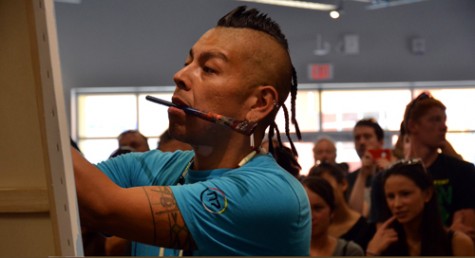Student Discretion is advised in class
Greg Lukianoff is the president of the Foundation for Individual Rights in Education. Photo courtesy of thefire.org
A UND philosophy professor says to the students on the first day of classes, “If you’re here expecting familiarity then I strongly suggest you consider dropping this class.”
Two minutes of awkward silence engulfs the room before the professor moves on to the syllabus. Now, for philosophy students, this intellectual technique is the only constructive way to “actually” learn. How and what we feel about the material should never reduce our capacity to engage deeply with it. For many students it is an ongoing struggle and with uneasiness comes real learning.
Nevertheless, there is an overwhelming consideration from professors to preserve the emotional well-being of their students at the expense of real and sincere class discussions.
Greg Lukianoff, the author of “The Coddling of the American Mind,” described the term “vindictive protectiveness” as a phenomenon that is currently on a rise with college students.
Lukianoff said, “The ultimate aim, it seems, is to turn campuses into “safe spaces” where young adults are shielded from words and ideas that make some uncomfortable.”
Lukianoff went on to say, “There are many levels of absurdity with this phenomenon that both faculty and students are responsible for.”
Lukianoff ultimately argues this phenomenon is threatening education and inhibiting professors from teaching their curriculum.
However, the most alarming thing for me as a student is the unwillingness of other students to experience that which “disturbs” them. They hide behind hypersensitivity to avoid the confrontation of topics like racism, religion, war, or any subject material that has a minimal requirement of self-criticalness.
In a healthy academic environment, students are supposed to encounter various and diverse opinions on issues that will annoy them, sadden them and even inspire them.
It is OK to be indifferent about a topic, nonetheless it is also more than fine to feel uncomfortable, irritated and angry by it.
For example, Lukianoff wrote that “a discussion of violence is unlikely to be followed by actual violence, so it is a good way to help students change the associations that are causing them discomfort.”
Professors are expected to warn students before any kind of sensitive material is presented, regardless of how crucial and significant the need to discuss it is. However, if you think about it, what is a better way to alter our judgments and preconceived notions than to allow ourselves to be moved by knowledge?
What is expected from students of “higher” education if they can’t even critically discuss today’s frustrating issues?
The topics of war, politics, racism and religion have become more relevant to our everyday lives. Choosing not to intellectually engage with these topics is a terrible decision that will inflict terrible consequences on ourselves as students and as capable thinkers.
We are not learning anything except how to safeguard our own unbothered ignorance.
Ekram Kofiah is a staff writer for The Dakota Student. She can be reached at [email protected]
















